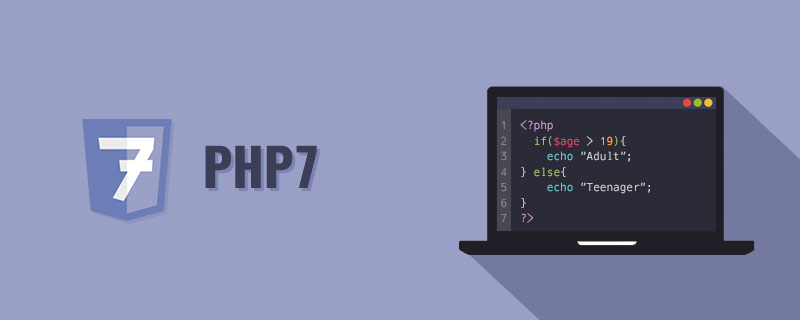Introducing new features from php7.3 to php7.4

1. Object attributes now support type declaration
<?php
class User {
public int $id;
public string $name;
}
?>In the above example, $id will be forced to be converted to integer type, $name is String type
Recommended (free):PHP7
2. Arrow function
Now the arrow function will Provide a short syntax for defining functions whose value declarations are unclear within the scope
<?php $factor = 10; $nums = array_map(fn($n) => $n * $factor, [1, 2, 3, 4]); // $nums = array(10, 20, 30, 40); ?>
3, limited return type covariance and parameter type covariance (Google Translate)
The following code will Will run
<?php
class A {}
class B extends A {}
class Producer {
public function method(): A {}
}
class ChildProducer extends Producer {
public function method(): B {}
}
?>Full diff support is only provided when using autoloading. Within a single file, only non-cyclic type references can be used because all classes must be available before being referenced
4, Null merge assignment operator
<?php
$array['key'] ??= computeDefault();
// is roughly equivalent to
if (!isset($array['key'])) {
$array['key'] = computeDefault();
}
?>5, Unpacking inside arrays (Google The translation is to unpack inside the array. See if this is wrong, use English first)
<?php $parts = ['apple', 'pear']; $fruits = ['banana', 'orange', ...$parts, 'watermelon']; // ['banana', 'orange', 'apple', 'pear', 'watermelon']; ?>
6. Numeric character separator
Numeric characters can include underscores between numbers.
<?php 6.674_083e-11; // float 299_792_458; // decimal 0xCAFE_F00D; // hexadecimal 0b0101_1111; // binary ?>
7. Weak references
Weak references allow the programmer to retain a reference to an object that cannot be prevented from being destroyed does not prevent the object from being destroyed.)
8. Allow exceptions __toString()
can now be thrown through __toString() Exceptions, which in previous versions would have resulted in a fatal error, existing string conversions that could have resulted in a fatal error have been converted to throw exceptions.
We will look at the rest of the expansion later
The above is the detailed content of Introducing new features from php7.3 to php7.4. For more information, please follow other related articles on the PHP Chinese website!

Hot AI Tools

Undresser.AI Undress
AI-powered app for creating realistic nude photos

AI Clothes Remover
Online AI tool for removing clothes from photos.

Undress AI Tool
Undress images for free

Clothoff.io
AI clothes remover

AI Hentai Generator
Generate AI Hentai for free.

Hot Article

Hot Tools

Notepad++7.3.1
Easy-to-use and free code editor

SublimeText3 Chinese version
Chinese version, very easy to use

Zend Studio 13.0.1
Powerful PHP integrated development environment

Dreamweaver CS6
Visual web development tools

SublimeText3 Mac version
God-level code editing software (SublimeText3)

Hot Topics
 How to Use Sessions Effectively in PHP 7?
Mar 10, 2025 pm 06:20 PM
How to Use Sessions Effectively in PHP 7?
Mar 10, 2025 pm 06:20 PM
This article details effective PHP 7 session management, covering core functionalities like session_start(), $_SESSION, session_destroy(), and secure cookie handling. It emphasizes security best practices including HTTPS, session ID regeneration, s
 How to Monitor PHP 7 Performance with Tools like New Relic?
Mar 10, 2025 pm 06:28 PM
How to Monitor PHP 7 Performance with Tools like New Relic?
Mar 10, 2025 pm 06:28 PM
This article explains how to monitor PHP 7 application performance using New Relic. It details New Relic's setup, key performance indicators (KPIs) like Apdex score and response time, bottleneck identification via transaction traces and error track
 How to Upgrade from PHP 5.6 to PHP 7?
Mar 10, 2025 pm 06:29 PM
How to Upgrade from PHP 5.6 to PHP 7?
Mar 10, 2025 pm 06:29 PM
This article details upgrading PHP 5.6 to PHP 7, emphasizing crucial steps like backing up, checking server compatibility, and choosing an upgrade method (package manager, compiling, control panel, or web server configuration). It addresses potentia
 How to Autoload Classes in PHP 7?
Mar 10, 2025 pm 06:20 PM
How to Autoload Classes in PHP 7?
Mar 10, 2025 pm 06:20 PM
This article explains PHP 7's autoloading, using spl_autoload_register() to load classes on demand. It details best practices like namespace-based autoloading and caching for performance optimization, addresses common issues (e.g., class not found
 How to Use Git for Version Control in PHP 7 Projects?
Mar 10, 2025 pm 06:27 PM
How to Use Git for Version Control in PHP 7 Projects?
Mar 10, 2025 pm 06:27 PM
This article guides PHP 7 developers on using Git for version control. It covers initialization, staging, committing, ignoring files, remote repositories, branching, merging, conflict resolution, and essential Git commands. Best practices for effic
 How to Deploy a PHP 7 Application to a Web Server?
Mar 10, 2025 pm 06:28 PM
How to Deploy a PHP 7 Application to a Web Server?
Mar 10, 2025 pm 06:28 PM
This article details deploying PHP 7 applications, covering methods (FTP, SSH, deployment tools), server configuration (Apache/Nginx, PHP-FPM), database setup, and crucial security considerations. It highlights common challenges like server compatib
 How to Use Xdebug for Debugging PHP 7 Code?
Mar 10, 2025 pm 06:26 PM
How to Use Xdebug for Debugging PHP 7 Code?
Mar 10, 2025 pm 06:26 PM
This article explains how to use Xdebug for debugging PHP 7 code. It covers Xdebug configuration (installation, php.ini settings, IDE setup), breakpoint usage (conditional, function, remote), and troubleshooting connection issues. Effective debuggi
 What is Object-Oriented Programming (OOP) in PHP 7?
Mar 10, 2025 pm 02:53 PM
What is Object-Oriented Programming (OOP) in PHP 7?
Mar 10, 2025 pm 02:53 PM
This article explains Object-Oriented Programming (OOP) in PHP 7, highlighting its benefits: modularity, reusability, maintainability, and improved code organization. It details classes, objects, inheritance, and polymorphism, illustrating their use






